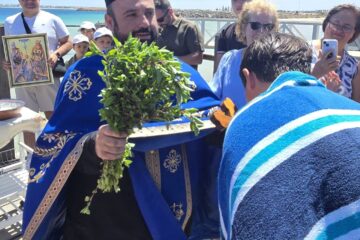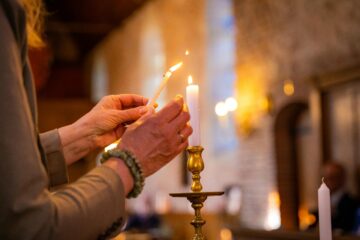Archimandrite Varnavas Lambropoulos
One week before Great Lent, our Church prepares us for the ‘arena of the virtues’. The main events in which we’re called upon to make a particular effort are fasting and prayer. But these are events which aren’t aimed at independent prizes, particularly ones which would threaten to fill us with self-satisfaction and hubris. The aim of all the ascetic struggles is the chief crown: love, a garland of blossoms which grow only in the ground of humility. Humility and love, then, are an inseparable pairing- one never exists without the other- and it’s to these that we should look as we perform our ascetic efforts in Lent, which will soon be upon us.
Love over all
The Epistle reading helps us to understand the deep meaning of fasting, in particular. For the Church, ‘fasting’ means neither diet nor some vague notion of the exercise of self-control. Saint Paul says that whether you eat or don’t eat is a matter of indifference in moral or religious terms. It acquires a spiritual dimension when it’s linked to the person of Christ.
For believers, ‘fasting’ means ‘I don’t eat, because of my love for Christ and out of obedience to the Church’. Of course, there can be no love for Christ if we don’t love other people, who weren’t only made ‘in the image of God’ but for whose salvation ‘Christ died’. This is why, if you put the smallest stumbling-block in the way of the salvation of your neighbor, ‘you sin against Christ’. Because he built his work on his sacrifice on the cross, and scandal-mongers destroy it through their selfishness.
In the early years of Christianity, the faithful shared society with idolaters. There were many who had only recently abandoned paganism, while there were more than a few who had a foot in both camps but ‘were close to completely abandoning the idols’, as Saint John Chrysostom says. Human nature’s always liable to change and there are always those who are unstable and weaker in their conscience. Especially if we take into account the warfare directed against us by the demons, we can readily understand how much at risk such people are of returning to the delusion of the idols.
The Church didn’t, in fact, forbid Christians from sitting and eating with pagans at the tables in the temples of idolaters. On the other hand, there were these vacillating souls we mentioned above who were scandalized at seeing Christians blithely entering such places and enjoying themselves. ‘They took the matter to be a form of encouragement’, that is, either to remain as pagans or to return to idolatry. What else was such behavior but a severe blow to their weak conscience, one which not only made them upset, but also placed them in danger of losing their soul?
The fourfold crime
This is why Saint Paul urged a special kind of fast: abstention from these particular foods which had been offered to idols. Saint John Chrysostom, attributing a rather stricter interpretation to the words of the apostle says: ‘even if no harm was done to anyone, even if there were no danger of scandalizing one’s neighbor, we should still abstain from eating food offered to idols. Because our presence at such a meal is not only an exercise in futility, but essentially means partaking of the food of the demons’. So it was not an infrequent occurrence that those, who without a second thought ate food that had been offered to idols, became an occasion for the loss of weaker brothers and sisters. In other words, they committed a mortal sin, which Saint John calls a ‘fourfold crime: first, because your neighbor’s been scandalized; second because their faith isn’t strong; third, because Christ cared so much for them that he died for their sake; and fourth, because a soul is lost over a plate of food’.
God’s preacher, Saint Paul, is quite right, therefore to put love above all else. His conclusion is one that he doesn’t impose on others, but which is testimony to his concern for the salvation of those whose conscience tends to be rather weak: ‘Therefore, if food is a cause of my brother’s falling, I will never eat meat, lest I cause my brother to fall’. He willingly surrenders a self-evident right and also declines to be bound by the law of Moses. It was a right that all the apostles possessed.
Justified boasting
Because Saint Paul had been slandered as regards his role as an apostle, he was obliged here to emphasize his equality with the other apostles. The Corinthians themselves could testify to his work as a teacher, since they’d been re-born by his preaching and had him as their spiritual father. In his second letter to them, he tells them that they have forced him to boast. It was a necessary boast because it prevented his children from stumbling over a potentially even greater scandal: that of doubting his mission.
In today’s epistle, through the mouth of Saint Paul, the Church reminds us that, in all our ascetic efforts, especially that of the Lenten fast (which, of course is not merely abstinence from food, but ‘alienation from all the passions’) we must strive conscientiously, but also with discretion. Discretion which makes us aware of our brothers and sisters who are weaker in faith and easily scandalized. These are also members of the body of Christ, members of his Church. And Saint John Chrysostom says that anyone who is indifferent to the salvation of others and says the Satanic words, ‘What do I care if so and so is scandalized’, should know that they’re participating in the savagery of the devil and his hatred towards humankind. God forbid, Lord.
Source: pemptousia.com




0 Comments